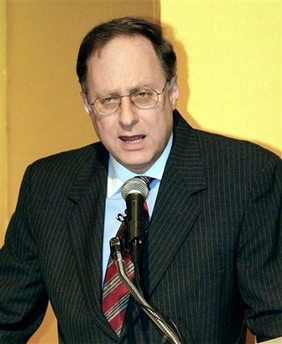N. Korea: Funds dispute nearly solved
(AP)Updated: 2007-05-16 08:33
SEOUL, South Korea - North Korea said Tuesday that steps were being taken to resolve a financial dispute that has blocked international efforts to halt its production of nuclear weapons in an indication of possible progress after weeks of delay.
 US Ambassador to South Korea Alexander Vershbow delivers a speech during a security forum in Seoul, South Korea, Tuesday, May 15, 2007. [AP]  |
North Korea has refused to start implementing a February agreement to shut down its nuclear reactor - missing a deadline that passed a month ago - until it receives funds from a bank in the Chinese territory of Macau that had been frozen after the bank was blacklisted by the United States in 2005.
North Korea's Foreign Ministry said it wanted to be able to "freely transfer funds."
"For this, works are under way so that funds at Macau's Banco Delta Asia can be transferred to our bank accounts at a third country," the ministry said in a statement carried by the official Korean Central News Agency.
The transfer has been held up because other banks have been reluctant to touch the $25 million in accounts that were freed with the blessing of the United States.
Washington has said the money was tied to alleged money laundering and counterfeiting by North Korea. Authorities say North Korea could withdraw the sum in cash, but it apparently wants to retrieve it through a bank wire transfer to prove the funds are now clean.
North Korea made the release of the money its main condition for halting its nuclear program, boycotting international arms negotiations for more than a year during which it conducted a weapons test in October.
On Tuesday, North Korea rebutted allegations it said were made in US media that it had been using the funds dispute as a delaying tactic, and it repeated its commitment to the disarmament deal.
"Once the fund transfer is realized we are willing to immediately take steps to shut down our nuclear facility as agreed," the ministry said, adding it would invite U.N. nuclear inspectors and discuss the matter with the US
"Once the Feb. 13 agreement gets implemented, our commitment will be clearly shown through our actions," the ministry said.
Earlier Tuesday, the US ambassador to South Korea called on the North to act on its pledge.
"It's time for North Korea to live up to its commitments," Alexander Vershbow told a security forum in Seoul. "The North has a lot to gain by ending its nuclear programs and getting rid of nuclear weapons."
Rewards include "economic assistance, normalized relations with the United States and a permanent peace regime for the Korean peninsula. ... In short, a fundamental transformation of the (North's) relations with the rest of the world and an end to its pariah status," he said.
The February deal calls for closing the reactor and disabling all of North Korea's nuclear facilities. Vershbow said Washington believes the action can be done in a "few months" and it hopes to achieve a complete denuclearization of North Korea before President Bush leaves office in January 2009.
In Vienna, Gregory L. Schulte, the chief US envoy to the International Atomic Energy Agency, said inspectors "are standing by to return to North Korea on short notice."
The IAEA itself had no comment.
|
||
|
||
|
|